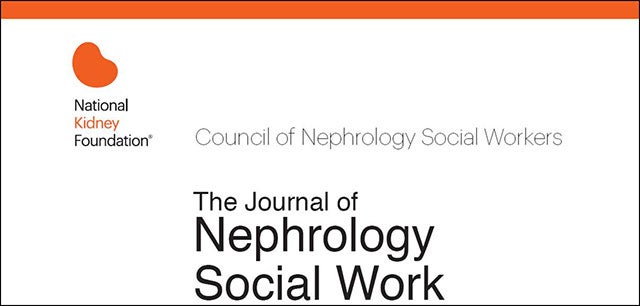The Journal Of Nephrology Social Work - Volume 41, Issue 2 (2017)

Table of Contents
Impact of Insurance Status on Outcomes After Kidney Transplant Among Out-of-state Recipients
Marcia Garcia, LCSW; Francis L. Weng, MD, MSCE; Tracy Grogan, MS; Lisandra D. Achaibar, MPH, Saint Barnabas Medical Center, Livingston, NJ
Patients with end-stage renal disease (ESRD) who wish to get a kidney transplant must have adequate insurance in order to be considered suitable candidates. States are not required to accept patients with out-of-state Medicaid coverage and are free to impose restrictions on coverage (Ehlers, 2002; Preussler, Farnia, Denzen, & Majhail, 2014). This study sought to determine, among out-of-state recipients who received kidney transplants at Saint Barnabas Medical Center between 2010 and 2014, the impact of having Medicaid as a secondary insurance provider. We also examined the relationship between patient outcomes and psychosocial variables. Patients with Medicaid as a secondary insurance plan had similar one-year allograft survival and similar rates of readmissions compared to patients with other insurance types.
Journal of Nephrology Social Work. 41(2):9-18. © 2017 National Kidney Foundation, Inc. This is an open access article under the CC BY-NC-ND license (http://creativecommons.org/licenses/by-nc-nd/4.0/).
Physical Health Score Assessment May Not Predict Mental Health Score of Dialysis Patients
Satwant Singh, MD; Navneet Kaur, MD; Maliha Ahmed, MD; Sandeep Aggarwal, MD; Karthik Ranganna, MD; Drexel University College of Medicine, Philadelphia, PA; Ziauddin Ahmed, MD; Drexel University College of Medicine, Philadelphia, PA, and Dialysis Corporation, Inc., East Falls, PA
The state of physical and mental health has been an important factor influencing the quality of life in the hemodialysis patient population. The SF-36 in the past, and now the KDQOL-36 questionnaire have been used routinely to assess illness perception and quality of life (QOL) among hemodialysis patients. However, it is not clear whether these surveys can truly predict the effect of physical illness on mental health. We present routine quality improvement data from a small cohort studied in an urban dialysis unit in which the social worker performed standard questionnaires per mandate, compared results to unstructured verbal interviews, and noted a poor correlation. The patients who were not expected to have negative perceptions of quality of life actually had negative findings. The findings were more prominent for the mental health aspect of the survey than the physical health aspect, which correlated with patients' symptoms. A total of 92 patients were surveyed and interviewed, and their mental health score could not be correlated in 44% of patients who had a low mental health score and 17.5% of those with a high mental health score.
Journal of Nephrology Social Work. 41(2):19-21. © 2017 National Kidney Foundation, Inc. This is an open access article under the CC BY-NC-ND license (http://creativecommons.org/licenses/by-nc-nd/4.0/).
Saved and Missing CMS-2728 Forms Could Affect ESRD Patients' Medicare Enrollment Benefits
Oniel Delva, BA, CTT+, Health Services Advisory Group (HSAG), Tampa, FL
Since 2012, healthcare professionals at Medicare-certified dialysis facilities have used CROWNWeb to electronically submit CMS-2728 Medicare Entitlement and/or Patient Registration forms directly to the Centers for Medicare & Medicaid Services (CMS). While a vast majority of CMS-2728 forms continue to be submitted to CMS and the Social Security Administration (SSA) correctly, data reveal an increase in the number of incomplete forms between 2012 and 2016. This article discusses the reasons forms remain incomplete in CROWNWeb, identifies how users can work to complete forms within a timely manner, and provides an overview of CMS's 2017 CMS-2728 form submission goals.
Journal of Nephrology Social Work. 41(2):22-25. © 2017 National Kidney Foundation, Inc. This is an open access article under the CC BY-NC-ND license (http://creativecommons.org/licenses/by-nc-nd/4.0/).
Utilizing Community Programs to Build Kidney Disease Self-Management Skills
Allyce Haney Smith, MSW, Caitlin Loughery, MPH, Ann M. Andrews, MPH, NKF of Michigan, Ann Arbor, MI; Susan Walker, MSW, Beaumont Health System, Royal Oak, MI
Kidney disease self-management relies on patient knowledge and self-efficacy to develop skills for day-to-day care of their chronic condition(s). The Chronic Disease Self-Management Program (CDSMP) is effective in promoting chronic disease selfmanagement among people with a variety of health conditions, but has not been studied among people with kidney disease. In 2016, the National Kidney Foundation of Michigan (NKFM) collaborated with Metro Detroit transplant programs to offer the CDSMP for people living with kidney disease and their caregivers. The study examined the effectiveness of the CDSMP with kidney disease patients by adding two kidney disease-specific sessions. A total of 45 people participated in the pilot program. Results included improvements in patient activation and self-efficacy to manage kidney disease.
Journal of Nephrology Social Work. 41(2):26-31. © 2017 National Kidney Foundation, Inc. This is an open access article under the CC BY-NC-ND license (http://creativecommons.org/licenses/by-nc-nd/4.0/).